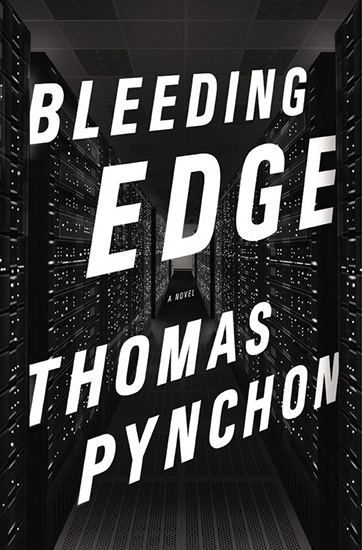For a writer who has used science, conspiracy and paranoia as a through-line for much of his work, it is easy to see why such excitement swirled around the announcement of Bleeding Edge, Thomas Pynchon’s new novel of 9/11 and the internet. Couple this with WikiLeaks, or the even more current scandal surrounding the NSA, and soon Pynchon devotees, it would seem, had the gift of sage-like prescience to bestow upon their hero as well as literary genius. It would seem. For as with his most of his fiction, all is not that in Bleeding Edge.
Taking the shape of a (very loose fitting) detective story, the novel is ostensibly the tale of independent fraud investigator, Maxine Tarnow, who is hired to look into the affairs of online oligarch, Gabriel Ice, and along the way stumbles across a web-based netherworld called DeepArcher. Of course, being a Thomas Pynchon novel, there is also so a cast of ridiculously named hackers; coders; movie bootleggers-cum- experimental film makers; Russian, Israeli and US secret service agents; detectives with the gift of recreating crime scenes through their sense of smell (when not obsessing over Hitler’s aftershave) and quasi-mystical cycle couriers; as well as the expected puns, songs, and popular culture references all pretty much on the money for its setting in the Manhattan of 2001. It is here that a real importance surfaces, for although New York City is hinted at as a character in the novel from the epigraph onwards, it is time as well as place that is significant.
The time in question is post dotcom bubble-burst; 9/11 happens about three-quarters through the book. Of course, no spoiler alert is needed here, for knowing we await such catastrophe is hardly a shock, in fact it’s almost the point, and although the attack on the twin towers does loom as a monumental piece of dramatic irony, that isn’t necessarily the function the event serves in the novel. Instead, Pynchon uses these two pieces of recent history – the metaphorical crash of Market Populism’s (until then) endlessly cresting wave and the literal crashing of those two passenger aircraft into the World Trade Center – to illustrate something else: what’s really changed? As self appointed IT freedom fighter Eric Outfield points out at one point in the novel, ‘…you’d think when the towers came down it would have been a reset button… instead lookit them, worse than before.’ This was a moment when everything should have changed. And it didn’t. Everything took to the same course but accelerated. And crashed again. And again nothing changed. So if such history shattering events can’t precipitate genuine, positive change in the real world, where do we go?

by Thomas Pynchon
This is perhaps the central question of the novel: the notion of finding a place of real possibility where history doesn’t just happen as it does to most of us. It is at this point that Bleeding Edge becomes more than a collection of great and not-so-great jokes about how fucked up everything is; more than a super-prescient anti-surveillance novel where the internet is described by Maxine’s father as ‘…creeping like a smell through the smallest details of our lives… conceived in sin, the worst possible.’ Because the internet is also the home of the aforementioned DeepArcher, a place (for a while) beyond the reach of Pynchon’s unholy trinity, a space outside of reality as it is dished up to us and all the more real for that – one whose population might even get to have a genuine effect on the place the populate. It is the possibility of something better.
This is not Utopian thinking though – DeepArcher doesn’t turn out to be paradise, even when dead people start cropping up there; nor is it a longing for lost Eden – one scene depicts dotcommers holding a sad party themed around the boom years, or ‘what passes for nostalgia in a time of widespread Attention Deficit Disorder’ – instead it is possibility, however fleeting, that provides a kind of propulsive hope. And even if from our 2013 vantage point the words of Maxine’s father seem to ring a bitter truth, a rather enigmatic moment towards the end of the book might serve us better. It comes via a conversation between Maxine and March Kelleher, the novel’s clownish activist and a person whose dress sense as well as her idealism often seem to be played for laughs. Seem to be. For here March is speaking of her daughter, Tallis, soon to-be-ex-wife of Gabriel Ice. March begins the exchange:
‘Everybody thinks they live in the real world and she doesn’t.’
‘So?’
‘So that’s what it is, to be an innocent person.’










